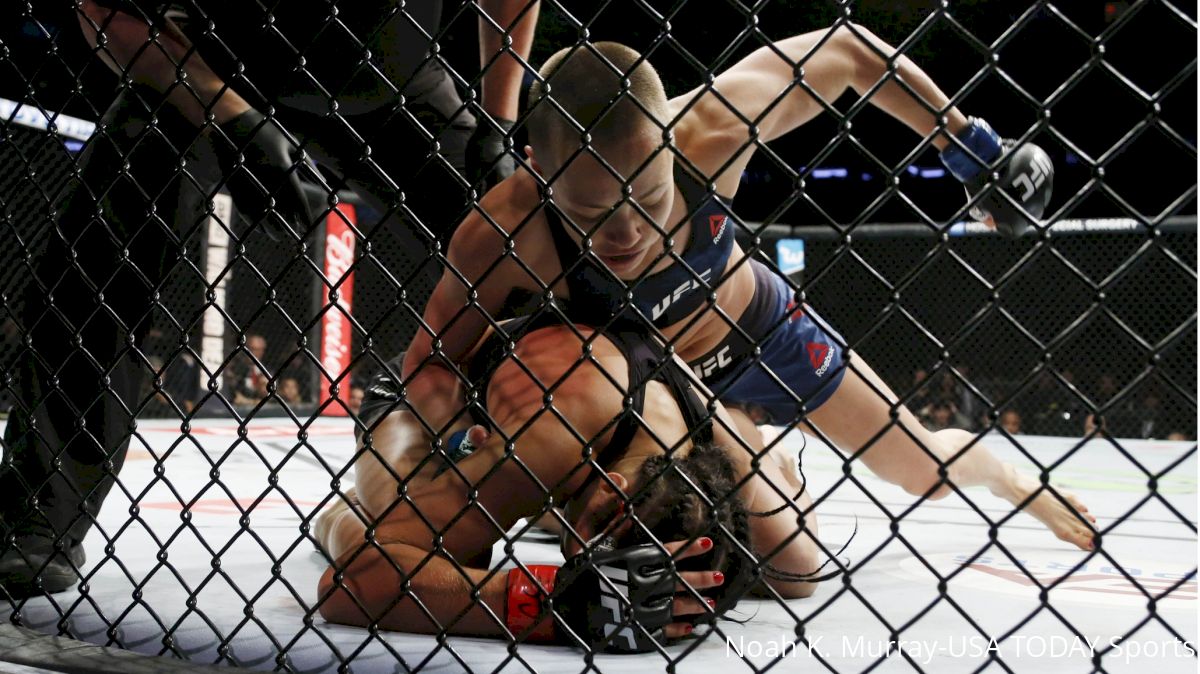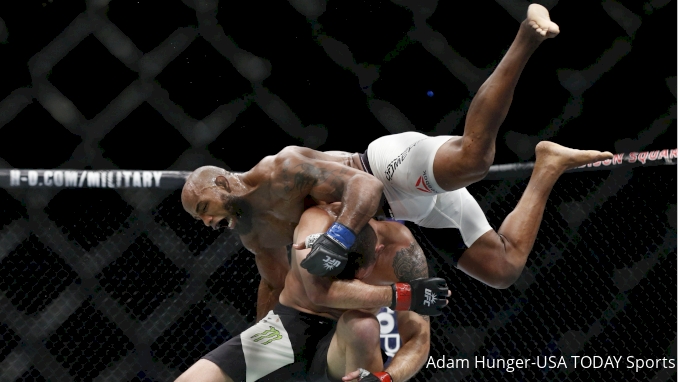Mindset Monday: Developing A Predator Mindset To Enhance Performance
Mindset Monday: Developing A Predator Mindset To Enhance Performance
Martial Arts Mindset Coach Mike Moor breaks down the importance of a predator vs. a prey mindset for martial arts, giving examples of both.

By Martial Arts Mindset for FloCombat
You have a choice in every moment in the cage, on the mats, and in your daily life: Are you going to be the predator or the prey fighter? It’s all about where you place your focus, and when mastered, this will change your entire life.
The animal kingdom is made up of predator and prey animals. The saying goes “eyes in the front, likes to hunt; eyes on the side, likes to hide.” Animals that are often considered “prey” have evolved to have eyes in the front of their head or further apart than a predator animal. This is to improve peripheral vision so that they can see everything that is going on around them and protect themselves. Think of squirrels, mice, and rabbits.
On the other hand, predator animals have eyes much closer together because they don’t need to be as concerned with the world around them. Instead, they are focused solely on their objective and need tunnel vision and laser-like focus to attack their prey. Think of lions, tigers, bears, and humans — yes, you are a natural-born predator!
“Losers focus on winners and winners focus on winning.”
Video - Rio Olympics 2016 Michael Phelps Men`s 100M Butterfly Destroys Chad Le Clos Again - https://t.co/wIHD6CSTch pic.twitter.com/ZV5p98q4Wt
— Digital Majority (@DigitalMajority) June 25, 2017
To succeed in fighting and in life, you must have a predator mindset. You must know how to focus on the right things.
Prey fighters are concerned with everything around them and things outside of their control or things that don’t matter — records, rankings, what other people think, “what if” scenarios, etc. The predator fighter doesn’t look ahead, doesn’t look around, and certainly doesn’t look back. They make decisions based on what they believe in regardless of others and keep the focus on themselves, the things they can control, and their task at hand.
Fighters must master the concepts outlined below and practice them in training and in their daily lives if they want to bring that predator mentality into competition.
Before we get started, here are five fighters I consider perfect "predators" inside the cage.
- Cris Cyborg
- Jon Jones
- Khabib Nurmagomedov
- Conor McGregor
- Rose Namajunas
Keep those five fighters (and their styles, mentalities, etc.) in mind as you read through the concepts below.
Narrow Your Vision And Focus On Your Objective
As mentioned earlier, there are many ways to think like prey but few ways to think like a predator.
While your technical game plan may change, the objectives of a predator remain the same from fight to fight and are based on performance (how well you fight), not outcome (wins/losses). By focusing on performance, the wins take care of themselves.
What are the objectives of a predator fighter? Simple: do harm and improve.
1) Break your opponent — Your No. 1 priority is to make them tired, uncomfortable, and ultimately quit. It is much easier to beat someone when they’re tired and out of their comfort zone. To sum this up in two words, “do harm.” No matter what you’re doing, make sure you’re doing harm to your opponent. This isn’t done only by strikes, submissions, or takedowns — it’s doing all the little things to wear your opponent down, like constant forward pressure, controlling the cage, heavy top pressure, staying aggressive and relentless (think of the pace and pursuit of Khabib Nurmagomedov during the Edson Barboza fight at UFC 219).
2) Improve your position at all times — Instead of focusing on outcomes or finishes, focus on constantly improving your position. That will lead you to the positions and situations that will allow you to control, to do harm. and to score points. Your focus is always on the offense, thinking offense and counter offense instead of attack or defend. In your stand-up, it could be as simple as constantly moving forward the entire time.
On bottom, you’re looking to either submit or to get up. You're not looking to contain and to avoid being hit. On top, it’s not just about getting the TKO or the submission. It could be getting to a more dominant position or even just applying pressure to distract and to do harm to your opponent. Against the cage, it’s not just about getting them to the ground. It could be just controlling the position and landing short strikes.
Having a sense of urgency to “do harm and improve” will open up the positions that lead to points, break your opponents, and hopefully lead to finishes.

Photo credit: Adam Hunger-USA TODAY Sports
Control The Controllables
Focusing on anything outside of our control or things that don’t matter is a waste of time and emotional energy. What are the important things in a predator fighter’s control during a fight or even during training? Simply put: effort, attitude, and aggressiveness. When you maximize these three things, you will maximize your performance.
EFFORT: Prey fighters take shortcuts, worry about getting tired, and try to coast. Predator fighters focus on giving a maximum effort in every practice and in every round regardless of their opponent, the score, how they feel, or the time on the clock. Predator fighters are focused on doing harm, making their opponent tired, and not what might happen to them.
ATTITUDE: Prey fighters have negative attitudes, make excuses, complain, worry about what others think, and are focused on outcome instead of performance. They are sore losers and are often found making excuses for what went wrong. Predator fighters approach every fight with the same intent — to dominate, not just win. Predators are never complacent.
AGGRESSIVENESS: Prey fighters are cautious and worry about making mistakes, so they lack the confidence to pull the trigger. Predator fighters hunt for their positions instead of waiting for an opportunity. They hunt for opportunities to do harm to their opponents and constantly improve their position. They keep the pressure forward and focus on doing harm and improving their position — controlling the center, scoring against the cage, and staying offensive on the ground, both on top and on bottom.
Turning Prey Thoughts Into Predator Thoughts Using Counterexamples
Predator or prey thoughts are synonymous with the ideas of the strong- or weak-minded and positive or negative thoughts.
When you start thinking negatively, you must immediately stop that negative, prey thought and flip it into a positive, predator thought using counterexamples.
Ultimately, the focus must always be on you. If you worry about getting tired, you can flip it and focus on how you can make them tired. If you’re worried about your opponents having a better record, you can remind yourself that records don’t matter. Name opponents you’ve beaten with better records, and remember that someone’s record doesn’t dictate how well they can fight you.
Prey Thought: My opponent is better at X, Y, Z than I am. They are a better boxer than me.
Predator Response: I’m better at A, B, C. My wrestling will shut down their boxing. I’ve beaten good boxers before (name them). My style is better than his because… me, me, me. Focus on what you are best at.
Other examples of prey thinking include worrying about letting people down, putting on a good show, and common stereotypes such as rankings, build/body type, fighting style, what gym they fight for, who they train with, what happened the last time you fought, their experience/age. Again, you find yourself focusing on anything but yourself or what you can control, steer the focus back to your strengths, and use counterexamples.
Ultimately, when it comes to having a predator mindset, it’s all about focusing on the right things. In fighting and in life, you can choose what you focus on. Stay laser focused on your task at hand, control the controllables, and keep the focus on yourself.
Remember: Losers focus on winners, and winners focus on winning.